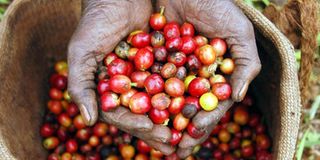Kenya coffee earnings up 10p.c.

Kenya is expected to produce 54,000 metric tonnes in the 2009/10 crop year. Photo/FILE
Kenya's coffee export earnings rose 10 per cent in the 2008/09 (Oct-Sept) crop year thanks to firmer prices after a lower Colombian crop, the chief executive of the country's Coffee Board said on Monday.
Loise Njeru said the East African nation netted Sh10.7 billion during the period, up from Sh9.7 billion a year ago.
"We hit 10.7 billion. For us it is significant because we were (last) there in 1999," Njeru told Reuters.
She said prices at the Nairobi auction were expected to remain buoyant on the back of production shortfalls in other producing nations.
"We are expecting that the prices will remain firm. We are in the same category with Colombian coffee -- their production has been suppressed because they were turning around their industry," Njeru said.
"We had a good ride while their production was getting depressed. Since they have not fully regained their production levels, we are expecting to continue enjoying good prices."
Output of the Kenyan crop, which is popular with global roasters who blend it with coffee from elsewhere, rose by 30 per cent to 55,000 tonnes during the same period, she added.
Production in 2007/08 was curbed by a severe attack of coffee berry disease due to cold weather and a phenomenon known as the biennial cycle where a good harvest is usually followed by a mediocre one as coffee trees regain ability to produce.
Target
The board expects Kenya to produce 54,000 metric tonnes in the 2009/10 crop year, Njeru said, adding the country was on course to hit its medium-term target of 100,000 metric tonnes annually.
"Our best ever was 130,000 over 20 years ago (1987/88)," Njeru said.
The sharp drop in the following years was brought by the rise of big competitors like Vietnam, among other factors.
Projected heavy rains in Kenya starting this month will impact coffee production and the regulator would carry out a study to determine exactly how much, Njeru said.
"Right now we can't put numbers on it," she said.
Government has been seeking to reform its tea and coffee industries to keep up with a fast-changing world and to maximise their contribution to overall economic growth goals
"We still have issues in the industry," said Njeru, adding that big estates usually complained about high costs of water -- for processing and irrigation -- as well as electricity.
The small producers segment, which accounts for 65 percent of coffee acreage and about 55 percent of output, is troubled by high input costs and governance problems, Njeru said.




